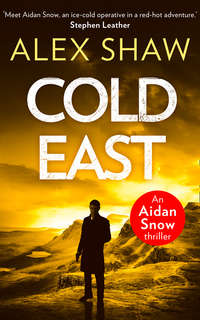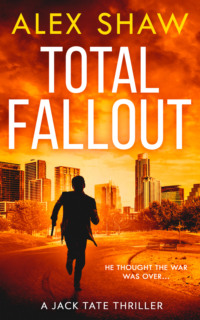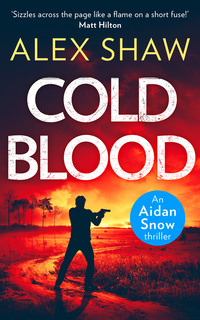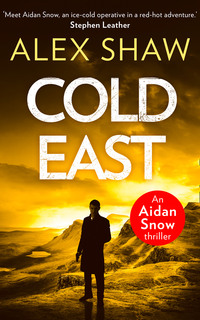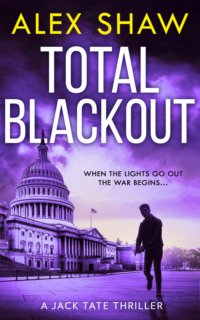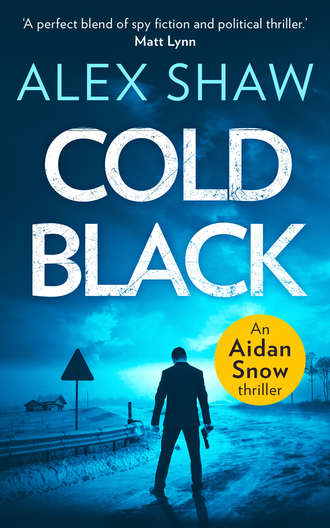
Полная версия
Cold Black
White was not perturbed. ‘If I may? The 2007 referendum, which the President won, allowing him to run for a third term, was criticised for being rigged.’
Sverov shook his head in disbelief. ‘Observers were present and they say to the contrary.’
Sverov continued to set out the policies of the Belarusian government and their hopes for wider cooperation with Europe.
White nodded. He was no fool. He had seen the information on the subsequent demonstrations in Minsk, which had been violently dispersed by heavy-handed riot police. ‘Why did the Committee to Protect Journalists describe Belarus as one of the ten worst places to be a journalist?
‘Again, this is based on lies. Let us look at the facts. Since 1994 the President has doubled the minimum wage and combated inflation by reintroducing state control of prices. Is this a bad place to be?’
‘Freedom of the press, is that not important?’
‘All freedom is important. My purpose is to preserve freedom. The state security services exist to preserve freedom.’
White didn’t give up. ‘So why is there no independent press or media in Belarus?’
Sverov tried not to show his anger; the journalist was attempting to lead the interview away from the agreed parameters. Perhaps he had been too hasty to judge White as different from the activists who attempted to attack his government and their achievements? He calmed himself and answered the question.
‘We welcome the media in Belarus; you are evidence of this. Our book-publishing industry is another example of this; it is thriving and we export many Russian-language books to other CIS states.’
White looked at his notes for a moment; the answer had been as expected – evasive. No mention had been made of the many independent newspapers forced to close due to ‘bureaucratic irregularities’, including failure to keep to regular publication dates. He tried a different tack. ‘Is it not true that the problem in Belarus…’
‘Problem!’ Sverov had started to lose his composure.
‘If I may continue? The “problem” is not official censorship, which is explicitly forbidden by your national constitution, but the volume of legislation used to curtail freedom of expression and silence internal dissent?’
Sverov fixed the journalist in the eye, a move the camera did not miss. ‘Such as?’
‘“Discrediting Belarus abroad” and “insulting the President”. These are criminal offences punishable by up to two and five years in jail, respectively.’
‘Yes, they are.’ The KGB Director nodded. ‘These laws protect the reputation and good standing of our country.’
White tried to come in. ‘But…’
Sverov held up his hand. ‘If I may finish? Let me cite one of your own UK laws, “Incitement to racial hatred”. This law makes it illegal to “deliberately provoke hatred of a racial group by distributing racist material to the public or making inflammatory public speeches, creating racist websites, inciting inflammatory rumours about an individual or an ethnic group, for the purpose of spreading racial discontent”.’
There was a pause. Sverov was happy he had remembered the lines word for word. ‘This is exactly what our laws protect against. Inciting racial hatred, against Belarus and its President.’
‘But these laws are being interpreted in a very sweeping manner. Take, for instance, the case of Mikolai Markevich, the editor of the Den newspaper. He was sentenced to eighteen months forced labour in 2002 for allegedly insulting President Lukachev…’
Sverov leaned forward in his seat. ‘Our laws dictate that, for national security reasons, I cannot comment on individual cases.’
‘But would you like to hear what Mr Markevich himself had to say on the matter?’
‘I do not think your audience would want to hear the ranting of a convicted criminal.’
Sverov was on the brink of cancelling the interview but feared the repercussions from the President. He had started well, made some good, persuasive points, and now had to ensure he continued in the same manner. White wasn’t going to make him look small or weak.
White pursed his lips before continuing. ‘The EU has shut its doors to you. Are you not the lonely man of Europe?’
‘Since 1998 we have been an active member of the Non-Aligned Movement, which has some 116 member states. This is the majority of the world community. Belarus, as a NAM member state, is not alone. Belarus has an active economy. We export more than 55% of our gross national product and 80% of our industrial production. There are not many countries in the world with the same coefficients of the export share. By “shutting the door”, the EU is losing a huge amount of trade with us. Therefore, while I would favour Belarus working more closely with EU member states, I believe we would not have much to gain by becoming a member – rather that the EU would gain more.’
‘Surely you can’t mean that?’ White was surprised. This response had been tantamount to Belarus turning her back on the EU.
‘Belarus is fortunate. We have old friends, such as Russia and Ukraine, new friends, such as the other NAM member states, and those whom we are not averse to becoming acquainted with, the EU and the US. However, we are perfectly happy at the moment and certainly not “lonely”. “Our dance card is full,” as you would say.’
‘What about the standard of living in Belarus? Is it not lower than in the West?’
‘By what measure? The number of US-imported goods?’ Sverov shook his head and smiled in what he thought was a scholarly manner. ‘Let us look at the findings of the “Save the Children” report, which compared 167 countries. Belarus has the highest rating for quality of life for women and children among all countries in the former Soviet Union. This is higher even than the new EU member states. Belarus is the leader, in the post-Soviet era, in the production and supply of agricultural goods per person, the GNP share for education, and the share of students of further education among the population. Belarus exceeds all CIS states in the generalised index of human development calculated by the UN. How can we have a “lower standard of living”? Is the UN incorrect?’
White nodded. The Belarusian had an answer for everything, which would make for amusing, if not politically astute, television. He wanted to move the interview on. He would ask about tourism next, then bring up the government ban on certain ‘rock groups’ performing in Belarus.
The interview over, the sound man removed the mic and thanked the Belarusian. Sverov stared at White, who was exchanging words with his unit director. They had far more people than he would have thought necessary recording this programme, but then they were the BBC and, he surmised, must be experts at what they did.
Riyadh, Kingdom of Saudi Arabia
Fouad Al Kabir held his diamond-encrusted Vertu mobile phone in his right hand and counted his worry beads with his left. The call had come directly from his brother, the Saudi ambassador in London. His eldest daughter, Jinan, was safe! Al Kabir gazed out over the city from his high office window and thanked Allah for his daughter’s deliverance.
‘But what of those who took her?’ They had to be punished.
‘Two escaped, the rest are dead,’ replied Umar Al Kabir.
‘You are certain she is not in danger?’ The younger brother wanted the elder’s reassurance.
‘Fouad, it was Jinan who called me herself.’
The sun reflected heavily off the window as it set in the desert sky, a mixture of reds and gold filling the room. Fouad finally let himself relax as Umar relayed what Jinan had told him about how she had been snatched from school and how a man had come from nowhere and saved her.
‘This is a man of honour, brother. He must be rewarded.’
‘I agree,’ replied the ambassador.
‘Where is my daughter now?’
‘She is safe. I will personally collect her, brother; as her uncle I will not leave that to another. I will be with her in an hour.’
‘Thank you.’
‘Do not thank me, brother. We are family.’
Flanked by two large bodyguards on each side, Umar Al Kabir entered his diplomatic Mercedes and ordered the driver to head for Brighton as fast as he could. They would pay no heed to speed limits, enforcement cameras, or traffic police. There had been an attempted kidnapping of a member of the Saudi royal family! Sitting comfortably in his leather seat, Umar Al Kabir dialled a Whitehall number very few people had, and was immediately connected to the British Foreign Secretary.
‘Robert, this is Umar. I have some strange and worrying news to tell you. Someone has tried to kidnap my niece.’
Paddington Green Secure Police Station, London
Left alone in the cell while his details were checked, Fox tried to make sense of the day’s events. He had killed three men, wounded a fourth, saved a child, and ended his marriage, all in the space of a minute. The police had arrived and cordoned off the street, forming a barrier. Arms raised above his head, Fox had approached them and given a description of the remaining X-rays and the Mondeo; however, they seemed more concerned with arresting him, the man responsible for the bodies on the ground. Now, three hours later, he sat in the secure police station being treated like a criminal.
His thoughts again wandered to Sawyer as he relived the scene in his head. Fox had seen the man’s face, had recognised him, and in that moment all his anger, all his frustration, had shot down his arm to his trigger finger. It wasn’t an accident; it had been a conscious decision. However, that would be difficult to prove. Sawyer had been in the way – in his line of sight during a firefight – and was an unfortunate victim of crossfire.
What about the kids’ videos? The fact that Sawyer had decided to run, to leave Tracey, proved he wasn’t a real man. What of his Tracey? This, he regretted – losing her. He could never be with her again, not now she had betrayed him, even if she forgave him for shooting her lover. It was his code: loyalty. Fox wasn’t a man to forgive betrayal; he hadn’t done in the past and he wouldn’t now. Shooting Sawyer was rough justice but in his mind was just that – ‘just’. Tracey would have to accept this and move on.
Fox shook his head and chuckled to himself demonically. Shit, he had felt more alive in that minute than at any other time since leaving the Regiment. Like a boxer making a successful comeback for the world title, he had felt elated. He had killed but more importantly he had saved. Saved the life of an innocent schoolgirl. In the Almighty’s book of ‘good and bad deeds’, he was sure saving her cancelled out ending the life of a terrorist or even a philanderer. Sawyer, a pathetic little man who hadn’t only cheated on his own wife, but taken another’s?
Fox felt bad for Sawyer’s wife, that was all; the man had no children. Fox wasn’t religious but in situations like this, after he had killed, he would sit and reason it out. This, however, had been the first time he had shot a man who wasn’t endangering his own life, an unarmed civilian. His first attempted murder? Perhaps Sawyer was dead; he had been told nothing.
The cell door opened, breaking his train of thought. A uniformed police officer, with greying temples, pointed at Fox. ‘Get up and follow me.’
Fox rose and walked out of the cell; the door was shut behind him by a second officer. The three men walked down a harshly lit corridor to an interview room. The door opened and he was ushered inside. A further two officers were sitting at the metal table.
‘Please take a seat, Mr Fox.’ DCI Mincer was fifty-five and had a round face that tended to put those he questioned at ease. These were enviable traits in a member of the anti-terrorist squad. Fox sat and Mincer started the tape recorder.
‘Interview with James Celtic Fox. Officers present, DC Flynn and DCI Mincer.’
Fox smirked at the second name; Mincer gave him a look that said, ‘I’ve heard it all before’.
‘Interviewee has declined the offer of counsel.’ Mincer started the interview. ‘Mr Fox. Can I call you James?’
‘Only my mother calls me James. My name’s Paddy.’
‘Can I call you Paddy?’
‘Knock yourself out.’
‘Paddy, we’ve checked the information you gave to our desk sergeant and I have a couple of questions.’
‘Fire away.’
Mincer ran his right index finger down a page of text. ‘You were in the army?’
‘Correct, man and boy.’
‘The Gordon Highlanders? You left the service in 2004.’
‘When I turned forty.’
‘Right, but after looking further at the army records you left the Highlanders in ’85 after serving four years. How do you account for this?’
Fox rolled his eyes. ‘I’m afraid that’s classified.’
‘Classified?’ Flynn snorted. ‘What do you mean?’
Paddy shrugged. ‘I’ve signed the Official Secrets Act. I can’t discuss that with you. I could tell you but I’d have to shoot you.’
Flynn blanched. ‘Is that an appropriate comment?’
Mincer placed his hand on Flynn’s shoulder. ‘Well, let’s move things on a bit. Ray?’
Flynn nodded and took over the questioning while Mincer listened. ‘You shot four men. Did you know them?’
‘No.’
‘What about Sawyer?’
‘Yes.’
‘So why did you shoot him?’
‘I didn’t know it was him.’
‘But you shot him.’ Flynn folded his arms.
The scene flashed in his mind. The cars, the girl, the X-rays, and then Leo Sawyer. ‘Yes. He was running, I thought he had a weapon.’
‘But he didn’t.’
‘No.’
‘You shot an unarmed man. An innocent man.’
‘I also shot three X-rays. I thought Sawyer was the fourth. I made a mistake.’
‘You murdered three men and attempted to murder a fourth.’
Fox’s eyes flashed. So Sawyer was alive? ‘I rescued a girl. A girl who was the victim of a kidnapping. Where is she now? How is she?’
Mincer spoke. ‘She was taken away by her uncle. She’s safe.’
‘Who was she?’
Flynn undid his top button. ‘A schoolgirl studying at Roedean. Now back to you…’
‘What about the other two, in the other car. Are they in custody?’
Flynn took a deep breath but Mincer, playing ‘good cop’, spoke. ‘No.’
Fox shook his head. ‘If your officers had listened to me first, rather than arresting me, there wouldn’t be two terrorists running free on the south coast!’
Flynn was breathing deeply. Fox could tell this wasn’t a game to him; he really was ‘bad cop’. ‘You shot an innocent bystander who was your former boss. Coincidence?’
Fox smiled; he would not rise to the bait. In the jungles of South America he had been interrogated by people with no rules and was now being snarled at by a man wearing an M&S machine-washable suit. He spoke slowly. ‘Yes, Mr Flynn. It was a coincidence and an accident. I didn’t know it was Sawyer when I pulled the trigger. It was a decision I took, but it was wrong. Unless you’ve been in a firefight, Mr Flynn, you have no frame of reference.’
Flynn fumed. ‘This was Shoreham beach not bloody Baghdad!’
‘But the guns were the same,’ Fox replied.
‘OK, OK.’ Good cop again. ‘Now, let’s go through your statement from the beginning.’
Residence of the President of Belarus, Minsk, Belarus
Crushing the sheet into a ball with his fist, the special adviser to the President of Belarus bellowed, ‘No… No… NO!’
Having never seen him so angry, the head of the Ministry of Energy shook as he spoke. ‘Eduard Alexeievich, what will be our response?’
Eduard Kozlov put his left hand on his hip and held the crushed memo up in his right. His eyes were burning with fury, his fist trembling as he spat. ‘Our response? They dare to prevent the nation of Belarus from receiving its gas? Our response will be to demand that they continue to supply us!’
Kushnerov hardly dared speak further but forced himself to do so. ‘I understand, Eduard Alexeievich, but what of the $500 million we owe them?’
‘They are thieves, Yarislav Ivanovich, thieves! Nothing more. When we were one country it was our shared gas, but now they expect us to pay $100 per 1,000 cubic meters! Our “strategic partner” wants to bankrupt us!’
Kozlov sat heavily at his desk. Kushnerov remained standing while the presidential adviser rubbed his eyes hard with his fists before gesturing that his visitor should take a seat. There was an uneasy silence. Both men had been part of the brokered agreement late the previous year that had fixed the price of gas for the next. Russia had already attempted to increase the price for several of her largest customers, including neighbouring Ukraine, stating that all such prices were based on ‘outdated Soviet agreements’. The result: Russia had turned off the supply to Ukraine for several days in late December. Deliveries to Russia’s largest European customers fell in turn as Ukraine allegedly ‘skimmed’ the gas it needed from an export pipeline transiting its territory.
Belarus, too, faced the taps being turned off. Under immense coercive pressure, and minutes before ringing in the New Year, they had hastily agreed a price: $100 per 1,000 cubic meters of gas – a massive increase from the previous price of $47. To soften the blow, however, Russia agreed that Belarus would pay just $55 per 1,000 cubic meters for the first half of the year, then make up the difference of nearly $500 million by the end of July.
It had been a delaying tactic – both sides knew this, but Russia had a further objective. Concerns were voiced in the EU parliament about the union’s reliance on Russian fuel; RusGaz supplied a quarter of Europe’s gas. Member states were starting to get nervous, looking into the possibility of finding alternative suppliers. In the Kremlin, worried words were exchanged. This was exactly the opposite image that RusGaz wanted to promote. In order to secure the transit of gas, thus allaying the fears of the Brussels ‘Eurocrats’, Russia threw Belarus a bone: sell half of your national pipeline company, Beltransgaz, to our gas company, RusGaz; your bill will then be paid and we will guarantee no more price increases. More importantly, the Russians didn’t need to add that the EU’s fears would be dismissed.
The ultra-nationalist President of Belarus was loath to sell off his country’s assets until told by his own people that they couldn’t afford to run them. Feigning indignity in public, but realising his lucky escape in private, he agreed. RusGaz purchased a percentage of Beltransgaz for $2.5 billion and, to show good faith, made initial instalments totalling $625 million. Yet by the due date for the Belarusian ‘gas bill’, the country had defaulted. RusGaz’s money had been transferred to the Belarusian Ministry of Finance and the $500 million went unpaid.
Kushnerov broke the silence. ‘We must ask the finance minister to pay up.’
Kozlov opened and closed his red-rimmed eyes. ‘That is what I shall advise the President.’
Kushnerov, by nature a timid and nervous man, clasped his hands tighter. He didn’t like this double-dealing and trickery. For him, a price was a price and a deal a deal – the old Soviet way – but now everything was skewed by capitalism, the need for greed. ‘So what is our response?’ The conversation, as he feared his lunch just might, had come full circle.
Embassy of the Kingdom of Saudi Arabia, London, UK
The international reporters and journalists sat and waited for the press conference to start. The ambassador’s press secretary had just finished going over the rules they must abide by: not to interrupt His Highness while he was speaking and not to address him unless he invited questions. The Saudis did press differently to almost everyone else. In their opinion the press were there to listen, accept, and report. The crews from the BBC and Sky News exchanged looks and rolled eyes.
His Highness Umar Al Kabir, Saudi ambassador to the United Kingdom, entered the conference room and sat. Behind him on the wall was a large banner emblazoned with the Saudi national emblem, the crossed swords above the palm tree. He looked at the amassed reporters from the international press and started his statement to them.
‘At approximately 11 a.m. today, my niece, Princess Jinan, was abducted from her place of education by a group of unknown men.’ There were deep intakes of breath around the room and camera flashes. Prince Umar continued. ‘She was gagged, bound, and placed in the back of a car. Her father, my brother Prince Fouad, was contacted this morning by the kidnappers, who made ridiculous demands.’ He paused and looked around the room, the flashbulbs of innumerable cameras painting his face. He nodded then continued. ‘I am happy to say that, as of 1 p.m. today, Princess Jinan is safe.’
There was a muttering around the room and several reporters threw up their hands, while others attempted to ask questions. Umar reined in his annoyance and instead addressed them directly. ‘Yes, you. Please ask your question.’
The reporter from Sky News started to speak. ‘Your Highness, can you please tell me if she was rescued or returned?’
Umar nodded. ‘She was rescued by a very honourable British citizen who happened to see her with the kidnappers.’ His lips curled up to form a smile; he was about to play his trump card. ‘You have video footage of the rescue already; you have been showing it on your networks for the past three hours.’
The room exploded as hands were thrown up; others left the room, retrieving mobile phones in order to call their networks.
Umar held up both hands. ‘Gentlemen, and ladies, on behalf of the Kingdom of Saudi Arabia I wish to personally reward and thank my niece’s saviour. I will be meeting with him here within the next two days. All of you are invited.’
Prince Umar stood, nodded, and left the room. The press secretary was mobbed by reporters and camera crews wanting more clarification.
In Whitehall, Robert Holmcroft slammed his fists on the desktop and swore out loud for the first time in years. His friend, Umar, had just bamboozled him. He had publicly thanked a murder suspect for saving the life of Princess Jinan, a man who was currently being held pending charges! The deaths had been playing on international TV screens all afternoon. As Home Secretary he had the power to issue a ‘DA-Notice’, an official ‘request’ to news editors not to publish items on specified subjects, for reasons of national security. This story should have come under DA-Notice 05: United Kingdom Security & Intelligence Special Services. But he had been too late. The cat was well and truly out of the bag with this story thanks to a pair of juvenile delinquents with 3G mobile video telephones using YouTube.
The light on his desk phone flashed and he glared at it before pressing the answer button. ‘Yes!’
There was a pause; his secretary was taken aback by his angry tone. ‘The Prime Minister is on the line.’
Holmcroft let out a sigh. ‘Put him through.’ This was going to be a very difficult conversation.
Minsk, Belarus
The man with no official title was the first passenger to step off the Belavia flight from Moscow. He was greeted by a large black government sedan and driven away without completing any form of customs formalities. Maksim Gurov was the deadly hand of the Premier Minister of the Russian Federation.
A former member of the Russian KGB, the FSB as it had become in 1995, he had been in the First Chief Directorate, responsible for foreign operations and intelligence gathering; within this, he had commanded the ‘Vympel’, the most secretive and deadly of all the KGB Special Forces groups.
He didn’t appear officially on any staff list. He was known only within the Russian Premier Minister’s very small and select circle of advisers, the powerful and the deadly. This meeting was to be with Ivan Sverov, head of the Belarusian KGB. No official records would be kept; to all intents and purposes, the meeting wouldn’t have taken place because Gurov didn’t officially exist. He hadn’t done so since 1995.
Gurov sat in silence in the back of the sedan as they sped towards the presidential dacha in the Minsk woods. He had a simple proposal to deliver and expected a simple answer. He would be back in the air within three hours, the last passenger to be let onto the plane.




